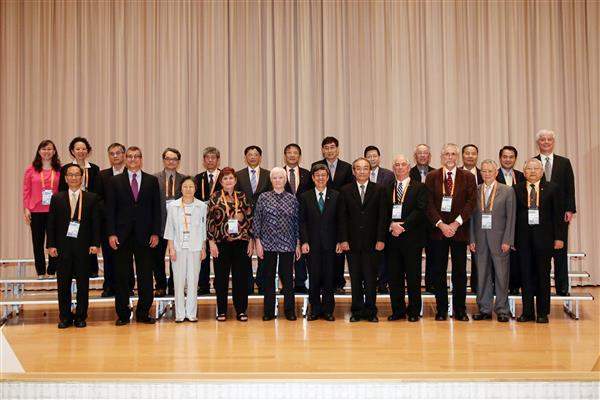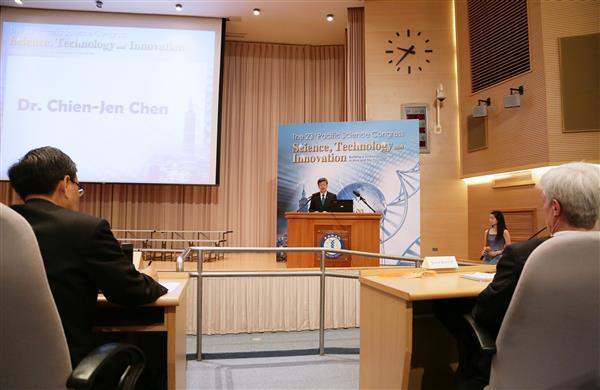News & activities
 News releases
News releases
2016-06-14
Vice President Chen's opening address at 23rd Pacific Science Congress
On the morning of June 14, Vice President Chen Chien-jen delivered an address at the opening ceremony of the 23rd Pacific Science Congress. In addition to explaining Taiwan's responses and actions on sustainable development, the vice president also stressed that Taiwan will not be absent on the prevention of global warming and climate change.
A transcript of Vice President Chen's remarks follows:
Acting President Fan-sen Wang (王汎森) of Academia Sinica, President Nancy Lewis of the Pacific Science Association, President Emeritus Lee Yuan-tseh (李遠哲), President Gordon McBean of the International Council for Science (ICSU), distinguished speakers, honored guests from around the world, and ladies and gentlemen:
Good morning! It's wonderful to be back at Academia Sinica and to see so many dear friends and colleagues. I would like to thank Dr. Chi-Huey Wong (翁啟惠), President Emeritus of Academia Sinica, for inviting me here today for the 23rd Pacific Science Congress.
This congress has a proud history of almost 100 years, and for the first time, Taiwan has the great honor of being the host. On behalf of the government and people of Taiwan, I would like to extend the warmest welcome to you all, and especially to our distinguished guests from overseas.
The focus of this year's congress could not be more timely and relevant for the challenges facing this region. How can we build a sustainable future for Asia and the Pacific? And how can science, technology, and innovation best contribute?
The organizers took great care in designing the program of three major themes and eight sub-themes, including: climate change and earth system sciences; biodiversity and natural resources; food, water and energy; human health; human diversity and inclusive development; disaster risk reduction; science for society – building green societies; and emerging technologies for sustainability.
This is a rich and exciting agenda, and many leading minds in the fields are sitting right here in this room, so the next four days will surely be illuminating on the future direction of our sustainable development.
I. Taiwan's Responses to Global Actions
If I may, I would like to share a few words on how Taiwan has pursued its sustainable development in parallel with global efforts.
As you would recall, in 1987 the Brundtland Commission published its landmark report, "Our Common Future", for the first time framing the challenge of sustainable development for the world.
In the 30 years since then, we kept seeing new scientific evidence that the threats were more serious than we had thought: global warming and climate change; biodiversity loss; ecosystem decline; sea-level rise and more. Societies faced a tough balancing act between developing the economy, meeting social needs, and protecting the environment.
In 1992, 171 nations came together in Rio, Brazil for the "Earth Summit," and adopted an action plan called "Agenda 21". The UN Commission on Sustainable Development was established to oversee the implementation.
Taiwan did not stay on the sidelines. In 1994, our government established a Working Committee on Global Environmental Change Policy, which later became the National Council for Sustainable Development (NCSD). Since 2002, our premier has personally chaired the Council.
At that time, only eleven countries in the world had sustainable development committees or organizations at the level of president or premier. This reflected the importance Taiwan attached to the matter.
Also in 2002, ten years after the Rio Earth Summit, the UN held the "World Summit on Sustainable Development" in Johannesburg, South Africa, and produced an updated declaration and action plan.
Taiwan again responded to this global call to action. Within three months after the summit, Taiwan published its own Action Plan for Sustainable Development, and also passed an Environmental Basic Law. In early 2003, Taiwan's own Declaration on Sustainable Development announced to the world: "We choose the path of sustainable development, with the year 2003 as the starting year."
The National Development Council initiated a system of sustainable development indicators, modeled on work done by the UN, to annually assess progress. Last year, of course, the world agreed on a set of Sustainable Development Goals, so work is ongoing to apply these to the Taiwan context.
There have been other noteworthy efforts as well. For instance, the Academia Sinica established a Center for Sustainability Science in 2012 to boost research on solutions.
Taiwan has made progress on many fronts, notably on air quality, energy efficiency and recycling. Ahead of last December's historic COP21 in Paris, Taiwan pledged to reduce its carbon emissions to 50% below 2005 levels by 2050.
II. The Challenges and Tasks Ahead
Despite the actions and progress, there remain urgent challenges.
Taiwan has a hugely dense population and a high level of resource consumption, but we import nearly all of our energy. The result is high per-capita carbon emissions, around 11 tons per person per year. We are also vulnerable to extreme weather events, which are likely to intensify as our climate changes, with large potential impacts on water quality and public health.
When Dr. Tsai Ing-wen and I were sworn in as president and vice president of this country last month, we committed ourselves to making sustainability a top priority of our administration. As President Tsai said in her inauguration speech, while we seek to re-energize Taiwan's economy, "we must not forget our responsibility to the environment."
Taiwan will not be absent on the prevention of global warming and climate change. The government will create within the Executive Yuan an office for energy and carbon-reduction. We will regularly review goals for cutting greenhouse gas emissions in accordance with the agreement negotiated at COP21.
Another priority is to promote five major innovative industries. One of them is "green energy". There is strong consensus in Taiwan to go nuclear-free, and we happen to have a world-class renewable energy industry. This scientific and technological strength can be harnessed to benefit Taiwan, the region and the world.
We may not be a member of the UN, but Taiwan will always be a model citizen of the international community. We will stand together with all nations to safeguard a sustainable earth for our children and grandchildren, and their children. They deserve nothing less from us.
I am confident that this congress will be a resounding success, and hope that the discussions in the coming days will light the way forward for the sustainable development of Asia, the Pacific, and the world.
So I would like to wish everybody a very fruitful and successful congress.
Thank you very much.
A transcript of Vice President Chen's remarks follows:
Acting President Fan-sen Wang (王汎森) of Academia Sinica, President Nancy Lewis of the Pacific Science Association, President Emeritus Lee Yuan-tseh (李遠哲), President Gordon McBean of the International Council for Science (ICSU), distinguished speakers, honored guests from around the world, and ladies and gentlemen:
Good morning! It's wonderful to be back at Academia Sinica and to see so many dear friends and colleagues. I would like to thank Dr. Chi-Huey Wong (翁啟惠), President Emeritus of Academia Sinica, for inviting me here today for the 23rd Pacific Science Congress.
This congress has a proud history of almost 100 years, and for the first time, Taiwan has the great honor of being the host. On behalf of the government and people of Taiwan, I would like to extend the warmest welcome to you all, and especially to our distinguished guests from overseas.
The focus of this year's congress could not be more timely and relevant for the challenges facing this region. How can we build a sustainable future for Asia and the Pacific? And how can science, technology, and innovation best contribute?
The organizers took great care in designing the program of three major themes and eight sub-themes, including: climate change and earth system sciences; biodiversity and natural resources; food, water and energy; human health; human diversity and inclusive development; disaster risk reduction; science for society – building green societies; and emerging technologies for sustainability.
This is a rich and exciting agenda, and many leading minds in the fields are sitting right here in this room, so the next four days will surely be illuminating on the future direction of our sustainable development.
I. Taiwan's Responses to Global Actions
If I may, I would like to share a few words on how Taiwan has pursued its sustainable development in parallel with global efforts.
As you would recall, in 1987 the Brundtland Commission published its landmark report, "Our Common Future", for the first time framing the challenge of sustainable development for the world.
In the 30 years since then, we kept seeing new scientific evidence that the threats were more serious than we had thought: global warming and climate change; biodiversity loss; ecosystem decline; sea-level rise and more. Societies faced a tough balancing act between developing the economy, meeting social needs, and protecting the environment.
In 1992, 171 nations came together in Rio, Brazil for the "Earth Summit," and adopted an action plan called "Agenda 21". The UN Commission on Sustainable Development was established to oversee the implementation.
Taiwan did not stay on the sidelines. In 1994, our government established a Working Committee on Global Environmental Change Policy, which later became the National Council for Sustainable Development (NCSD). Since 2002, our premier has personally chaired the Council.
At that time, only eleven countries in the world had sustainable development committees or organizations at the level of president or premier. This reflected the importance Taiwan attached to the matter.
Also in 2002, ten years after the Rio Earth Summit, the UN held the "World Summit on Sustainable Development" in Johannesburg, South Africa, and produced an updated declaration and action plan.
Taiwan again responded to this global call to action. Within three months after the summit, Taiwan published its own Action Plan for Sustainable Development, and also passed an Environmental Basic Law. In early 2003, Taiwan's own Declaration on Sustainable Development announced to the world: "We choose the path of sustainable development, with the year 2003 as the starting year."
The National Development Council initiated a system of sustainable development indicators, modeled on work done by the UN, to annually assess progress. Last year, of course, the world agreed on a set of Sustainable Development Goals, so work is ongoing to apply these to the Taiwan context.
There have been other noteworthy efforts as well. For instance, the Academia Sinica established a Center for Sustainability Science in 2012 to boost research on solutions.
Taiwan has made progress on many fronts, notably on air quality, energy efficiency and recycling. Ahead of last December's historic COP21 in Paris, Taiwan pledged to reduce its carbon emissions to 50% below 2005 levels by 2050.
II. The Challenges and Tasks Ahead
Despite the actions and progress, there remain urgent challenges.
Taiwan has a hugely dense population and a high level of resource consumption, but we import nearly all of our energy. The result is high per-capita carbon emissions, around 11 tons per person per year. We are also vulnerable to extreme weather events, which are likely to intensify as our climate changes, with large potential impacts on water quality and public health.
When Dr. Tsai Ing-wen and I were sworn in as president and vice president of this country last month, we committed ourselves to making sustainability a top priority of our administration. As President Tsai said in her inauguration speech, while we seek to re-energize Taiwan's economy, "we must not forget our responsibility to the environment."
Taiwan will not be absent on the prevention of global warming and climate change. The government will create within the Executive Yuan an office for energy and carbon-reduction. We will regularly review goals for cutting greenhouse gas emissions in accordance with the agreement negotiated at COP21.
Another priority is to promote five major innovative industries. One of them is "green energy". There is strong consensus in Taiwan to go nuclear-free, and we happen to have a world-class renewable energy industry. This scientific and technological strength can be harnessed to benefit Taiwan, the region and the world.
We may not be a member of the UN, but Taiwan will always be a model citizen of the international community. We will stand together with all nations to safeguard a sustainable earth for our children and grandchildren, and their children. They deserve nothing less from us.
I am confident that this congress will be a resounding success, and hope that the discussions in the coming days will light the way forward for the sustainable development of Asia, the Pacific, and the world.
So I would like to wish everybody a very fruitful and successful congress.
Thank you very much.
Related News
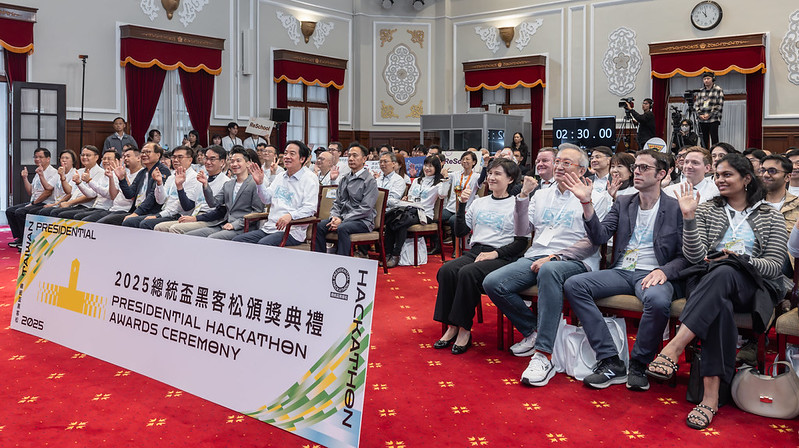
2025-12-14
President Lai attends 2025 Presidential Hackathon awards ceremony
On the morning of December 14, President Lai Ching-te attended the 2025 Presidential Hackathon awards ceremony. In remarks, President Lai pr...
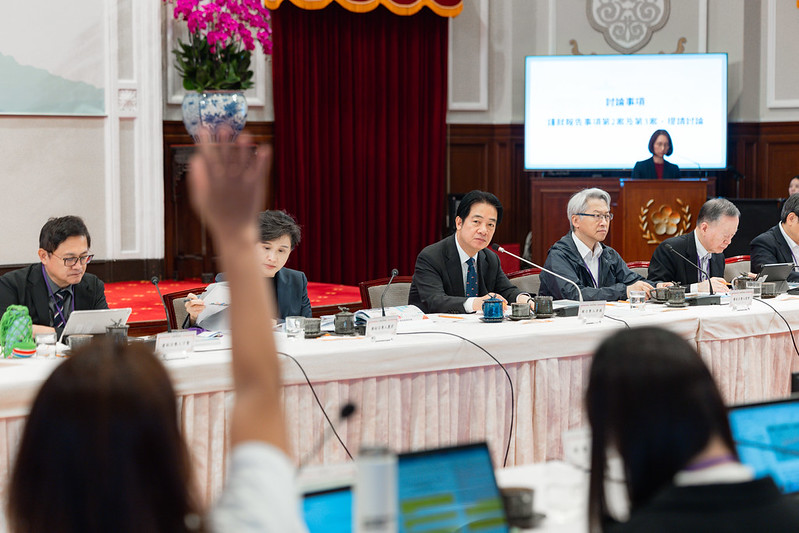
2025-10-30
President Lai presides over fifth meeting of National Climate Change Committee
On the afternoon of October 30, President Lai Ching-te presided over the fifth meeting of the National Climate Change Committee. In his open...
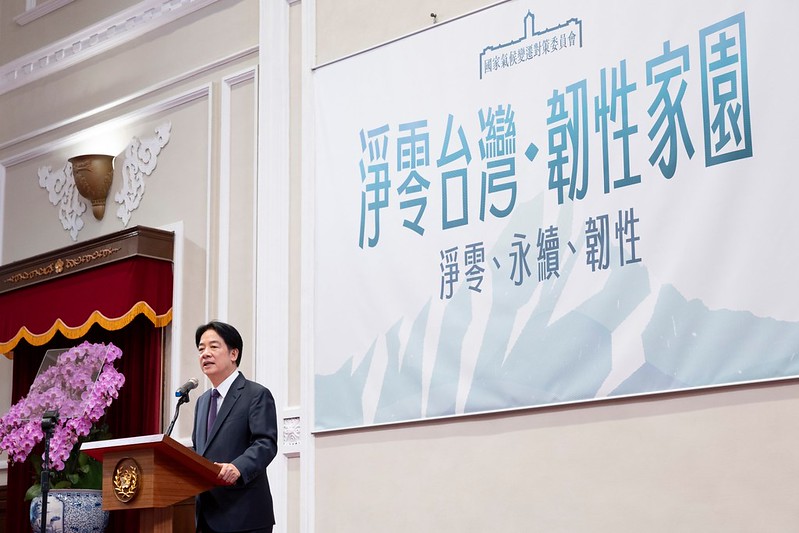
2024-08-08
President Lai presides over first meeting of National Climate Change Committee
On the afternoon of August 8, President Lai Ching-te presided over the first meeting of the National Climate Change Committee. As the commit...
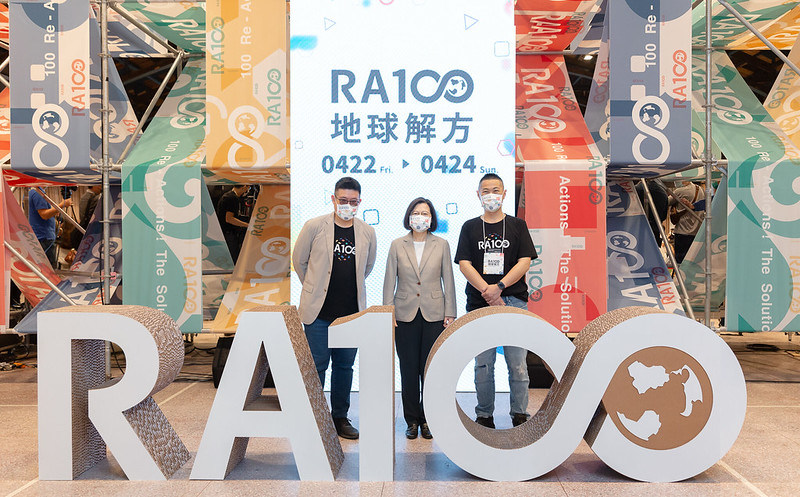
2022-04-22
President Tsai attends environmental sustainability forum
On the morning of April 22, Earth Day, President Tsai Ing-wen attended the 100 Re-Actions forum on environmental sustainability in Taipei. I...
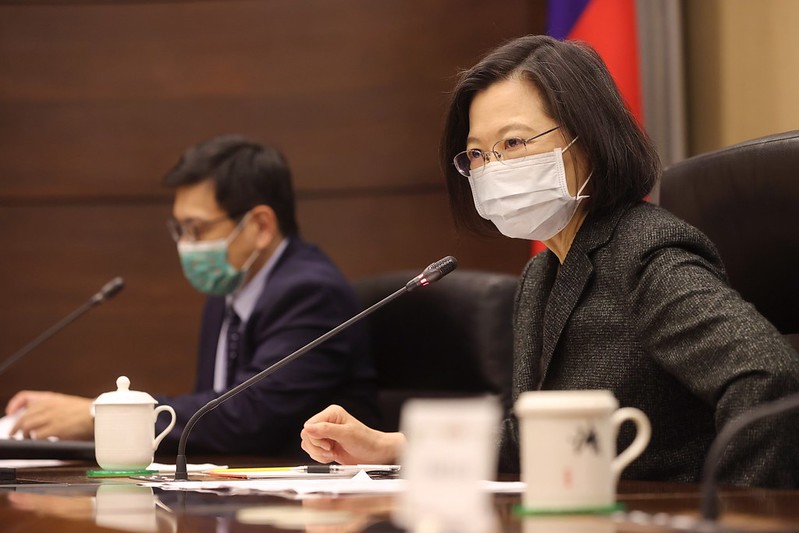
2021-12-09
President Tsai meets senior delegation from SEMI and renewable energy sector
On the morning of December 9, President Tsai Ing-wen met with a senior delegation of representatives from the industry association SEMI and ...



